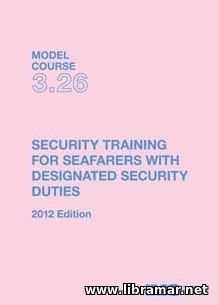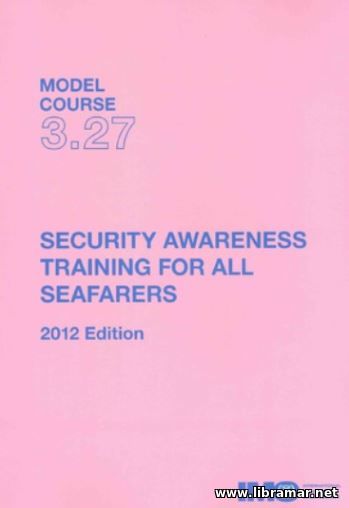 The material of the present IMO model course is arranged in nine main parts. The first part gives some introduction to the subject of security awareness and its critical importance, and gives some brief information on the vessel and port operations. The second part is dealing with the maritime security policy, and here the trainees will reach some familiarity with the relevant legislation including the international conventions and codes, as well as the officially published recommendations.
The third part addresses the security responsibilities including the ones of the operating company, vessel, SSO, CSO, and PFSO, standing for the Ship Security Officer, Company Security Officer, and Port Facility Security Officer, respectively. The ship security assessment is discussed in a separate part of the volume, followed by the one on the security equipment, systems and their operational limitations, maintenance and testing.
After that the trainees learn how to identify, recognize, and respond to the different threats. The remaining parts of the course give necessary information on the security administration, emergency preparedness, drills, and ship security actions.
 The main content of the present IMO model course was prepared to give readers all required understanding of the security awareness and make sure that the ship crew members with no security duties assigned relating to the SSP, i.e. Ship Security Plan, to participate and contribute in the ship security.
The trainees who complete all chapters of the present course will be considered having enough knowledge, therefore reaching the necessary competence standard. They will get to know the meaning of the different ship security levels and associated requirements, contingency plans and emergency measures.
In addition to that, they will get better in the recognizing and detecting different types of weapons and dangerous substances, as well as the human behavioral patterns. Apart from that, this training will equip trainees with the necessary techniques that are commonly applied to circumvent the ship security measures, and this particular skill is definitely critical to provision of the security of your vessel.
The maritime security policy and security responsibilities are detailed together with the ship security actions. Due attention was paid to the identification of the threats, their recognition and prevention, as well as shipboard exercises, drills and emergency preparedness.
 The content of the present training course has been developed on the basis of the training guidelines released by the world respected SIGTTO earlier, as well as the materials provided by the Directorate of Shipping. The trainees will start with the familiarization section covering such aspects as ship simulation and tank arrangement, piping and associated systems, instrumentation, cargo containment, essential procedures and operations.
Then, they will proceed to the special operations and procedures including tank ventilation, cargo liquefaction and boil-off matters, gas freeing, inert gas systems etc. After that, they will go through two sections addressing the ballast and cargo operations including ballasting/deballasting, cargo handling, plus the procedures to be followed when loading and unloading.
The closing section of the course deals with the different real life operational problems together with the associated remedial actions. The course is highly recommended to the crew members of the vessels transporting the LPG, or liquefied petroleum gas, and the trainees who have satisfactorily completed all items, will be considered duly prepared for working on board such ships.
 The content of the present course will provide a good introduction to the assessment of the seafarers, as well as their certification and examination, with the primary focus placed on the associated internationally accepted regulatory framework and practice.
Upon completion of the course, the students will be considered provided with sufficient knowledge and obtained necessary skills to be able to conduct administration, supervision and monitoring of the assessment and professional training of the seafarers as per the relevant provisions of the STCW Convention and Code.
They should also be able to perform evaluation and application of the processes needed for implementation of the aforementioned provisions in accordance with the national law, understand the methods and process of the national assessment and examination, be able to choose the proper methods of assessment, get involved in the organization and administration of the assessment activities.
Of course, they will also be able to show their ability to issue the certification paperwork and control the whole process of assessment, examination and certification. Make sure you have checked the content before you start the course.
 This is the final draft of the IMO Model Course dealing with the energy efficiency on board marine ships. The intention is to promote the good technical training of the shipboard personnel in order to eventually improve the efficiency of using the energy on board.
As a result, this would eventually contribute to the protection of the environment, following the guidelines outlined in the IMO Resolutions nos. A.998(25) and A.947(23) through introducing and implementing the best practices. This, in turn, would allow achieving significant reduction in the amount of the GHG emissions. In addition to the above, the present course is covering the basic subjects intended to develop the managerial instruments to be applied by the shipping companies for the management of the environment protection.
The trainees who have completed all parts of the training will be considered aware and proficient in identification of the actions and considerations taken by the IMO in the field of greenhouse gas reduction, development and application of the associated industry best practices, establishing the SEEMP, i.e. the ship energy efficiency management plans, and maintaining the subject plan at all times.
 The IMO Model; Course 7.08 has been developed specifically having the shipboard electrical officers in mind. The idea was to provide them all with the training and technical knowledge they would need when performing their duties on the vessels. The content of the course encompasses three basic functions, starting with the electrical, control and electrical engineering taken at the operational level.
The second function will address the technical maintenance and repair, while the third one deals with the controlling the ship operation as well as the personnel safety. The arrangement of the course is traditional for all other IMO Model Courses, most of which are available in this section of the website.
Among the key training objectives declared by the providers of the course we would underline the routine maintenance and repair of the different shipboard electrical equipment and machinery, including the control and automation systems on modern ships, navigation and communication equipment, and even the cargo handling and deck machinery, since all of them involve electric parts and that is the reason why the course shall be satisfactorily taken and passed by all people intending to work as electro-officers.
 This is another IMO Model Course intended to be taken by the crew members willing to get better understanding of the leadership and teamwork. The main content of the course is arranged in eight sections, the first section is introductory and the eighth section provides conclusive remarks.
The trainees will start with getting the information about the shipboard management personnel and associated training, including the crew organization, cultural awareness, informal social structures that can be found on board ships, human error factor, shipboard training programs etc. after that they will proceed to the international maritime conventions, recommendations and associated national regulatory framework.
The ability of the personnel to apply the task and workload management properly is discussed in the next section of the course, including the coordination and planning, personal abilities and limitations, management styles, challenges, and other important aspects. The remaining sections of the course cover such the important areas as effective resource management, decision-making techniques to be applied, professional and personal development, and self-awareness.
 Those who have satisfactorily completed all sections of this IMO Model Course 2.06 will be able to take active part in provision of the operation/control of the shipboard ballast and cargo installation thus improving the tanker safety and environment protection. They will get familiarized with the equipment and controls that are normally used on board tankers with the purpose of handling cargo.
They will also get fully aware of the importance of pre-planning as well as the use of the checksheets when performing the cargo operations, as well as of the application of the safe procedures. Due attention was paid by the authors of the course to the identification of the operational problems and finding the ways to solve them.
After the basic introduction to the subject, the trainees will proceed to the section devoted to the special procedures and operations involved, including the COW, i.e. crude oil washing, tank cleaning, draining and straining, evaluation of the in-tank atmosphere etc. The ballast and cargo operations are dealt with in the next two sections, followed with the one about the operational problems mentioned above, possible system faults and malfunctions, together with the remedial actions.
|







